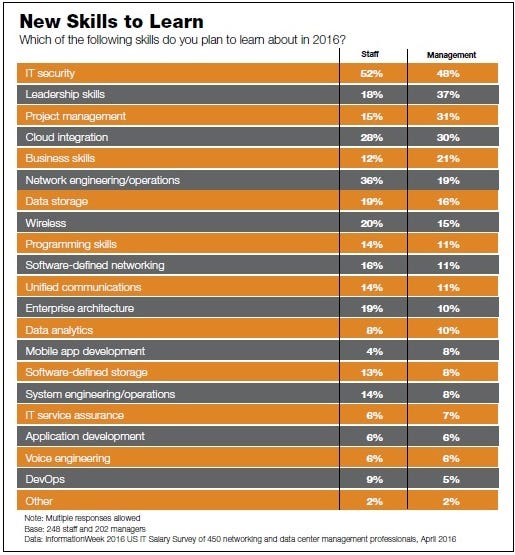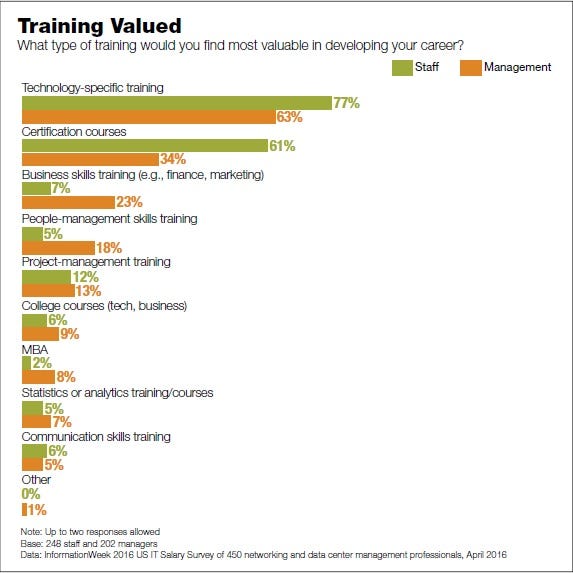Infrastructure Pros Look To Add Skills
Security skills a priority for many IT pros, according to InformationWeek US IT Salary Survey.
August 23, 2016

As data center and networking jobs change with the rise of cloud and software-defined infrastructure, those working in the infrastructure field are actively looking to expand their skillsets.
Indeed, it's always been a requirement for IT pros to keep technical skills current, but that need may be accelerated now as the industry undergoes dramatic change, as indicated by the InformationWeek US IT Salary Survey. Don West, infrastructure lab manager at Systems Made Simple and survey participant, pointed to cloud computing as the driver for that need. "If 'old school' infrastructure folks do not update their skills to the cloud skills that many companies are looking for, they are going to find themselves antiquated," he predicted.
When asked what specific skills they planned to learn in 2016, survey respondents chose security as their number one priority, at 50%. Staff-level employees also cited network engineering and operations (36%), cloud integration (28%), wireless (20%), and data storage (19%). Those at the management level chose leadership skills (37%), project management (31%), cloud integration (30%), and business skills (21%). In follow-up interviews, respondents also specified they'd like more training in Amazon Web Services, Microsoft Azure, and agile project management.

7-new skills V2.jpg
When it comes to the type of training respondents would like, the more technical the better. Seventy-seven percent of staff and 63% of managers chose technology-specific training as most desirable, followed by certification courses at 61% for staff and 34% for managers.

6-training valued V2.jpg
Survey respondent Jonathan Harris, network engineer at Northwest Pipe Company, pointed out the value of independent, technology-based training. "Vendor-specific training and certifications hold less value than training that gives me working knowledge of the underlying technologies and how they interact," he said. "I wear many different hats. If I spend too much time and money learning how to work on one specific vendor's system, something else will get neglected.
Seven in ten of respondents reported attending company-paid training or certification courses in the preceding 12 months. However, approximately 30% paid for training themselves, and 30% received no additional skills training at all. Fortunately, free training options exist for those will small budgets. West explained that the growing demand for programming skills has led him to seek free education in that area. "It is for that reason I have been taking Massive Open Online Courses from Coursera and EDx, as well as leveraging vendor training webinars or hands-on labs," he said.
Nancy Jones, a system administrator at Vectrus, observed a reduction in employer-funded training as well. "It's hard to get companies to foot the bill for training and education for techies. I’m trying to start a local professional development group so we can share knowledge and get experience that helps advance our careers," she said. She noted that businesses will reason that they don’t want to pay to train employees who may then leave to work someplace else, but she opined, "That sounds like a lot of fried chicken."
Job satisfaction and security
Despite the challenges of the industry, 89% of respondents said they feel a career in IT is as secure or more secure than most other careers. And a majority said they feel a career path in IT and the potential for salary advancement are as promising today as five years ago — 50% for staff and 57% for management. (See Figure 8.)
Overall job satisfaction rates were equally optimistic and have risen slightly since our last survey in 2014. Seventy-one percent of managers and 61% of staff were satisfied or very satisfied by all aspects of their job, including compensation, benefits, and other factors. In contrast, only 8% of managers and 15% of staff said they were dissatisfied or very dissatisfied. To underline that point, a mere 10% of respondents related they are actively looking for a new job with a different employer. (See Figure 9.)
Of course, a happy and productive work environment is the result of a combination of many factors. When asked, "What matters most to you about your job?" the number one response, predictably, was base pay. Ranked almost as high was company stability, followed by having one's opinion and knowledge valued, benefits, challenge of the job, job atmosphere, and flexible work schedule. Said one respondent, "There are lots of new opportunities in IT even if the salary is not going up. Once you get to a certain point, money only goes so far."
Staying ahead of the curve
IT has always been a demanding career, requiring constant education and a list of certifications for those wanting to truly excel. However, new market dynamics focused on applications and services could be challenging the wisdom of deep specialization, especially for those working in networking and data centers. The answer is clearly additional training and education, but becoming a full stack engineer is not a realistic goal for many, nor does it fit within the traditional IT departments our survey respondents inhabit.
To remain relevant, infrastructure professionals must understand exactly how they contribute to their organization's success, and how they can make even more of an impact. Companies are transforming to leverage newer and better technology, and need staff who can recommend platforms and products that can achieve their business goals. Perhaps an organization needs faster production times, better customer data, or a more efficient salesforce. Technology is the key to solving these problems, and technologists who contribute to the strategic as well as the technical discussion will likely find continued success.
About the Author
You May Also Like




